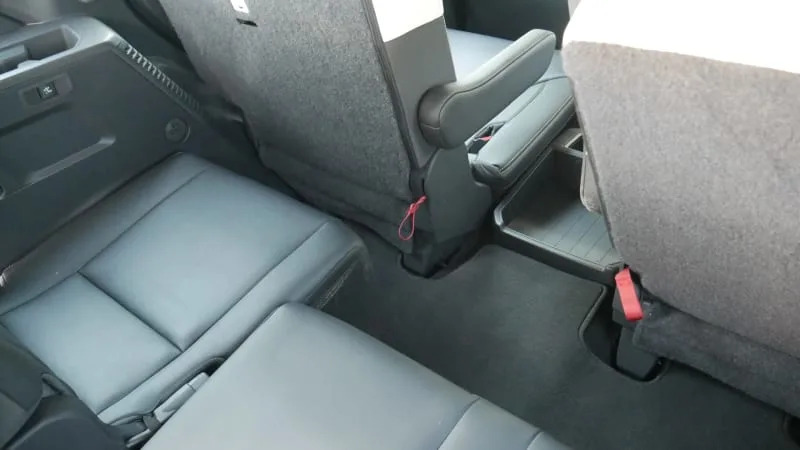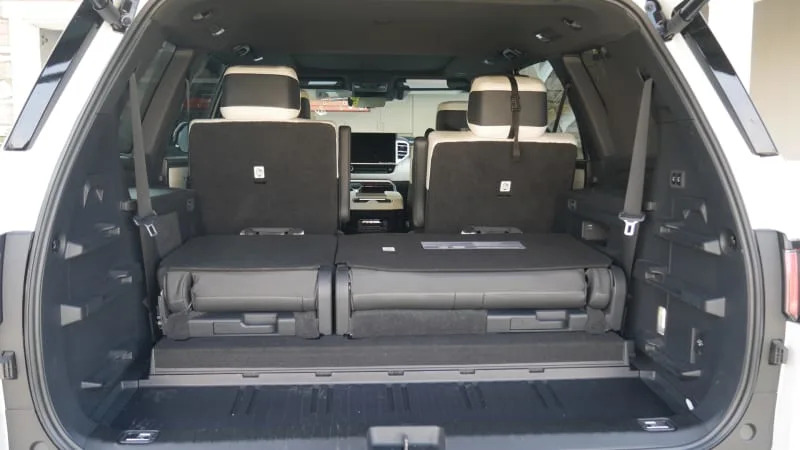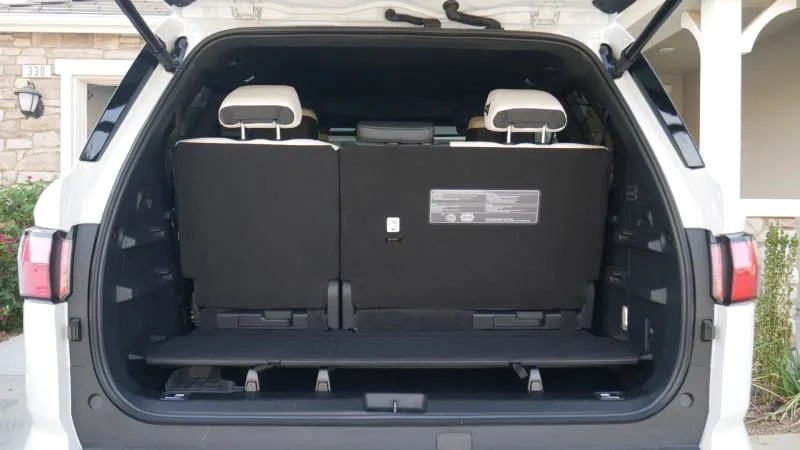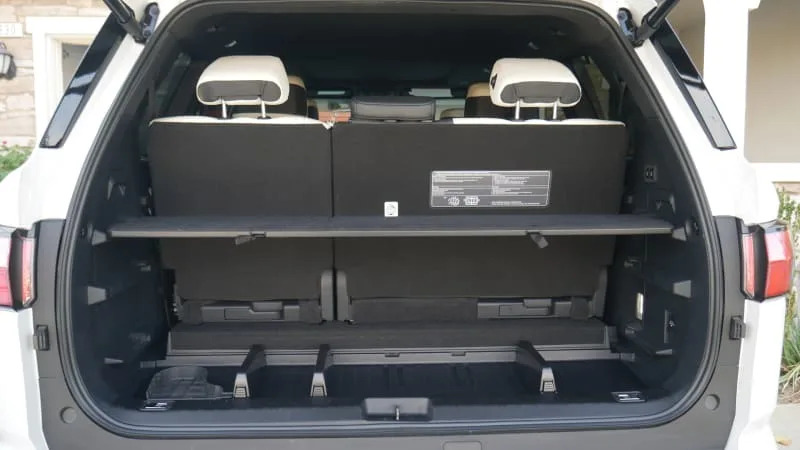2024 Toyota Sequoia Review: Big and powerful, but very compromised
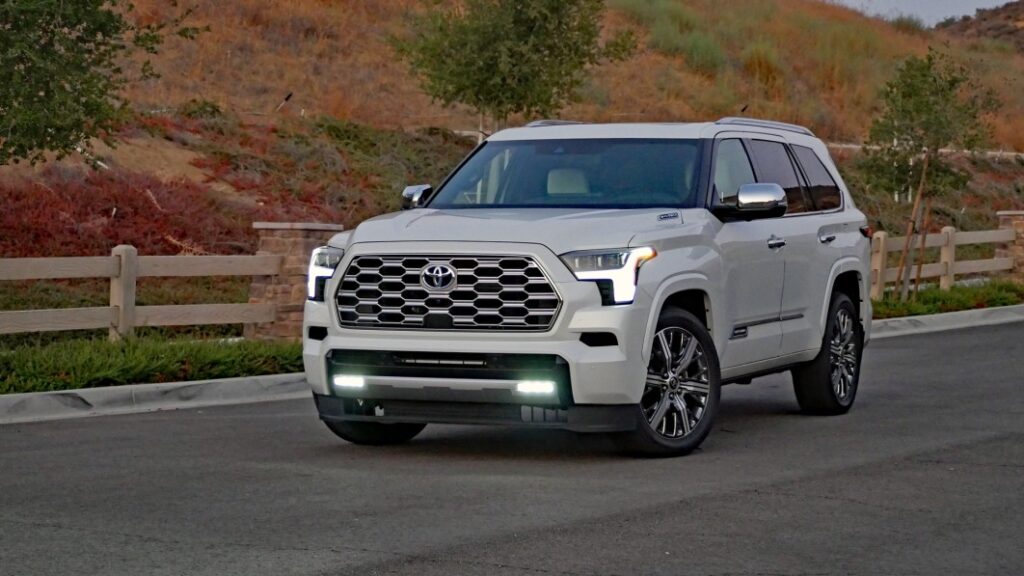
Pros: Cool TRD Pro trim level; potential above-average fuel economy; competitive towing capacity
Cons: Poor cargo space; iffy value; Capstone’s teeth-chattering ride; comparatively cumbersome handling; irksome tech
If you’re looking for an SUV that’s big, powerful and definitely looks big and powerful, the 2024 Toyota Sequoia will get the job done. Its TRD Pro trim level also brings its big and powerful game off-road, where it can tackle terrain nothing else in the full-size SUV segment is likely to dare. And if you want the promise of longevity and resale value that Toyota has long offered, well, the Sequoia should deliver that, too.
The trouble is, if you’re looking for a big and powerful SUV to provide more people and cargo-hauling capabilities than a big crossover like Toyota’s new Grand Highlander, you’re going to be sorely disappointed. Redesigned last year, the latest Sequoia generation is actually smaller than its predecessor with a solid rear axle that robs it further of interior space and hampers both the handling and ride (the old Sequoia had an independent rear end like the Ford, GM and Jeep full-sizers). Put simply, third-row space and cargo capacity are uncompetitive. We’ve also found the handling to be cumbersome, even by full-size SUV standards, and the ride quality shockingly bad on the range-topping Capstone trim. Lower trims are better, but don’t rise to the level of competitors.
So yes, the Sequoia will work for those who really only need five seats and want a big, powerful rig … but we think most can do a lot better than that for basically the same price.
Interior & Technology | Passenger & Cargo Space | Performance & Fuel Economy
What it’s like to drive | Pricing & Trim Levels | Crash Ratings & Safety Features
What’s new for 2024?
A new Nightshade package arrives for the Limited trim level, swapping black exterior trim for the standard alloy and chrome. The TRD Off-Road package can also now be added to the Platinum trim level, bringing its Bilstein shocks and springs to a ritzier trim level. Finally, the Sequoia is nearly $3,000 more expensive this year, including the $1,850 obligatory destination charge that went up by $255. You don’t actually get anything more for that $3,000, either.
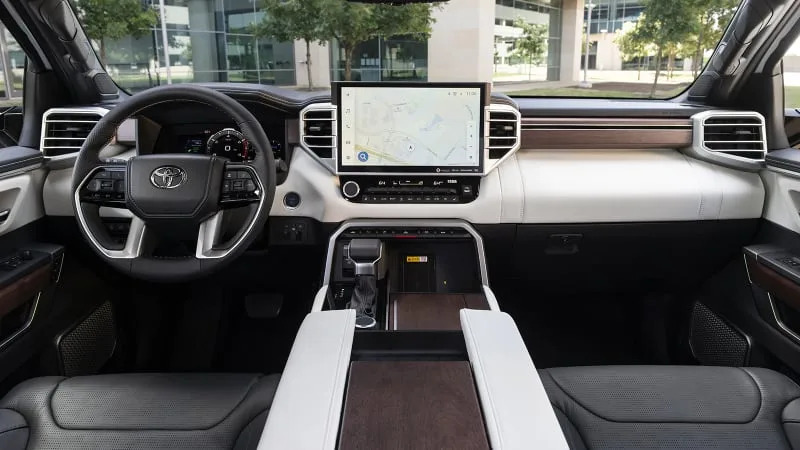
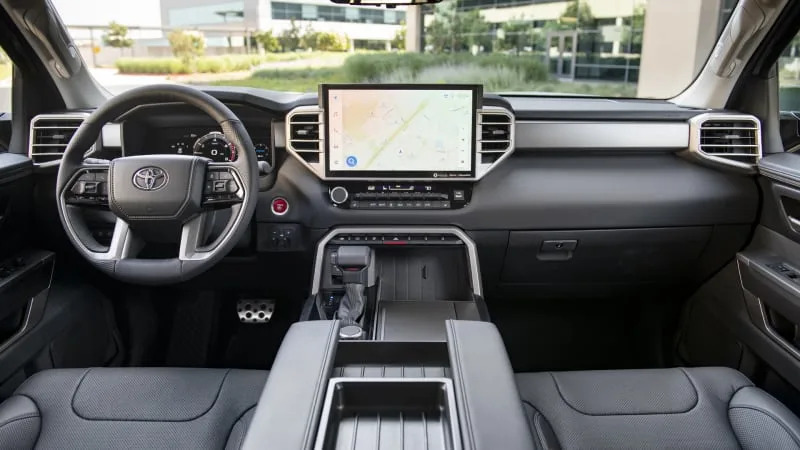
What are the Sequoia interior and in-car technology like?
The Sequoia shares its cabin design with the Tundra full-size truck. It really doesn’t suffer for that fact in terms of aesthetics, but it perhaps explains why you’ll find a few more hard plastics inside than a Chevy Tahoe or Jeep Wagoneer. Upper trim levels do spruce things up, including the TRD Pro’s unusual red camouflage print seats (below) or the Capstone’s ritzy combination of open-pore wood trim, black seats and white leatherette interior trim (above).
Standard on most trim levels is an enormous 14-inch touchscreen (the base SR5 gets an 8-inch unit). The operating system is the newest Toyota has to offer, featuring bright, minimalist graphics and natural speech recognition. It’s responsive and runs quickly. The shortcut icons on the side closest to the driver are easy to reach, but they unfortunately disappear when you use Apple CarPlay or Android Auto, meaning you have to click-click-click to escape the Apple/Android interfaces rather than using a simple Home button like Toyota used to feature. There are other annoyances we discovered, including some radio functionality and a navigation system that defaults back to point-forward every time you move off the map screen, as if it can’t possibly contemplate someone wanting to consistently use North UP. All told, the system is less user-friendly than what you’d find in a Tahoe/Yukon, Expedition, Wagoneer and their luxury variants.
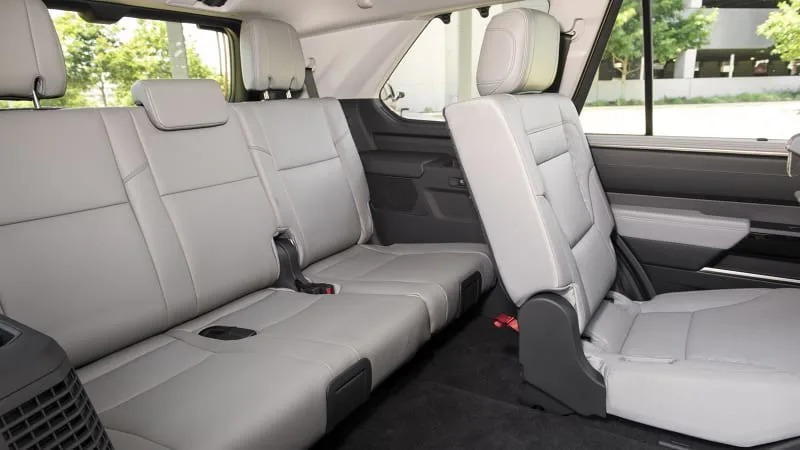
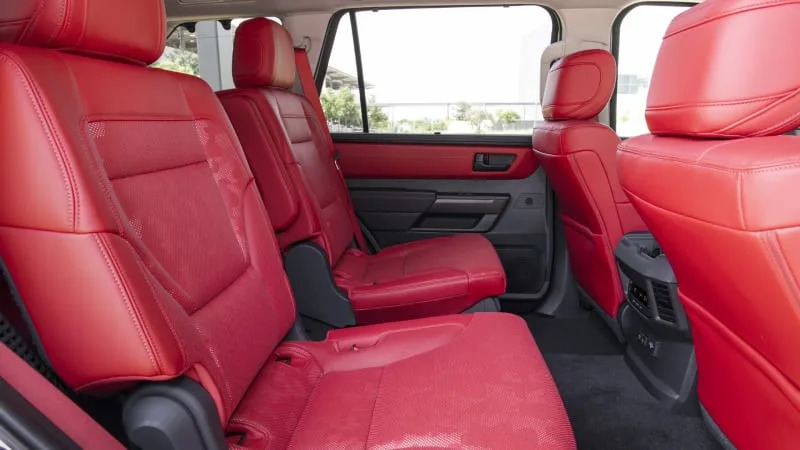
How big is the Sequoia?
As a full-size SUV, the Sequoia is obviously enormous on the outside compared to a crossover like the Highlander or even an SUV like the 4Runner. It is smaller than its American full-size SUV competitors on the outside, however, and packaging issues at the rear make it even smaller inside. Quite simply, the Sequoia’s third-row seat and cargo area are not competitive.
While fully grown teens and adults can comfortably fit for hours in the third row of a Tahoe/Yukon, Expedition or Wagoneer, the Sequoia is best suited to those of smaller stature, and even then for shorter trips only. It’s more akin to what you’d find in a three-row crossover, albeit with a higher step-in height. Now, it does uniquely slide fore and aft, but that’s more for the sake of cargo space.
Despite that feature, cargo space is extremely compromised. The biggest issue is that the third row does not fold flat into the floor as its competitors’ do, nor can it be removed. The result is basically a stage for your belongings that requires a significant lift and lean in to reach. With the third-row in use, space shrinks to a degree bested by most large three-row crossovers, including the new Grand Highlander. And true, you can slide that third row forward to free up extra space, but you’re just shrinking the third row even further and the result still falls short of what you can fit in the American competitors. Toyota at least came up with a clever multi-level cargo floor and partition system, but this largely seems like a workaround for a fundamental flaw.
What are the Sequoia fuel economy and performance specs?
Every Sequoia gets a hybrid powertrain dubbed i-Force Max. It consists of a 3.5-liter twin-turbo V6 and a single electric motor sandwiched between the engine and a 10-speed automatic transmission. It is a fundamentally different design than Toyota’s traditional, efficiency-oriented hybrids. Indeed, while the Sequoia does achieve above-average EPA fuel economy estimates, its performance benefits are the bigger deal: 437 horsepower and 583 pound-feet of torque. Torque in particular betters its gas-powered GM, Ford and Jeep rivals. Its 9,520-pound towing capacity also eclipses them.
Fuel economy also bests them at 21 mpg city, 24 mpg highway and 22 mpg combined with standard rear-wheel drive, or 19/22/20 mpg with optional four-wheel drive. In the real world, however, we didn’t come remotely close to that, averaging around 16 mpg in a mix of highway and suburban driving. The GM and Ford SUVs were thriftier.
What’s the Sequoia like to drive?
Although the Sequoia is a hybrid, you’d be hard pressed to tell while driving, so don’t go expecting a 6,000-pound Prius here. The twin-turbo V6 is just as burly as any V8, if not burlier. Press the throttle, and the electric motor and turbo engine coordinate to provide smooth, effortless torque, which keeps coming all through the rev range. Push it harder, and you get a deep, throaty growl. It’s even louder in the TRD Pro, which gets a cat-back exhaust. The traditional 10-speed automatic also means there’s no droning as you’d get from the e-CVT transmissions in other Toyota hybrids.
There’s also the matter of off-roading, which is an area the Sequoia will excel in relative its more road-oriented competitors (including the definitely-not-Trail-Rated Jeep Wagoneer). Whether opting for the TRD Off-Road package and its Bilstein shocks and springs, or going whole hog with the TRD Pro (pictured above) that gets all-terrain tires, increased ground clearance, upgraded front stabilizer bar, Fox shock and unique springs, skid plates and other visual enhancements, the Sequoia can ably get dirty.
That’s where the good bits end. Handling fails to clear even the low bar set by full-size SUVs, as it’s rather barge-like with light, vague and slow steering. A soft suspension and solid rear axle are never a formula for chassis poise and driver confidence. The ride quality is OK in most trims, but we would strongly urge you to avoid the range-topping Capstone and its teeth-chattering ride. It makes perfectly normal, smooth pavement feel like washboard dirt roads as it constantly shivers and vibrates. The decision to add gigantic 22-inch wheels to the combination of a body-on-frame truck chassis and a solid rear axle was not a good one. That it comes in a nearly $80,000 SUV that supposedly can compete with an entry-level Escalade or Navigator is laughable.
What other Toyota Sequoia reviews can I read?
2023 Toyota Sequoia First Drive Review: New and improved, but not enough
Read more about the many changes for 2023, its new engineering and design, and more in-depth driving impressions of different versions.
2023 Toyota Sequoia TRD Pro Road Test
Take a deep dive into the most compelling trim level … although we still found much to be desired.
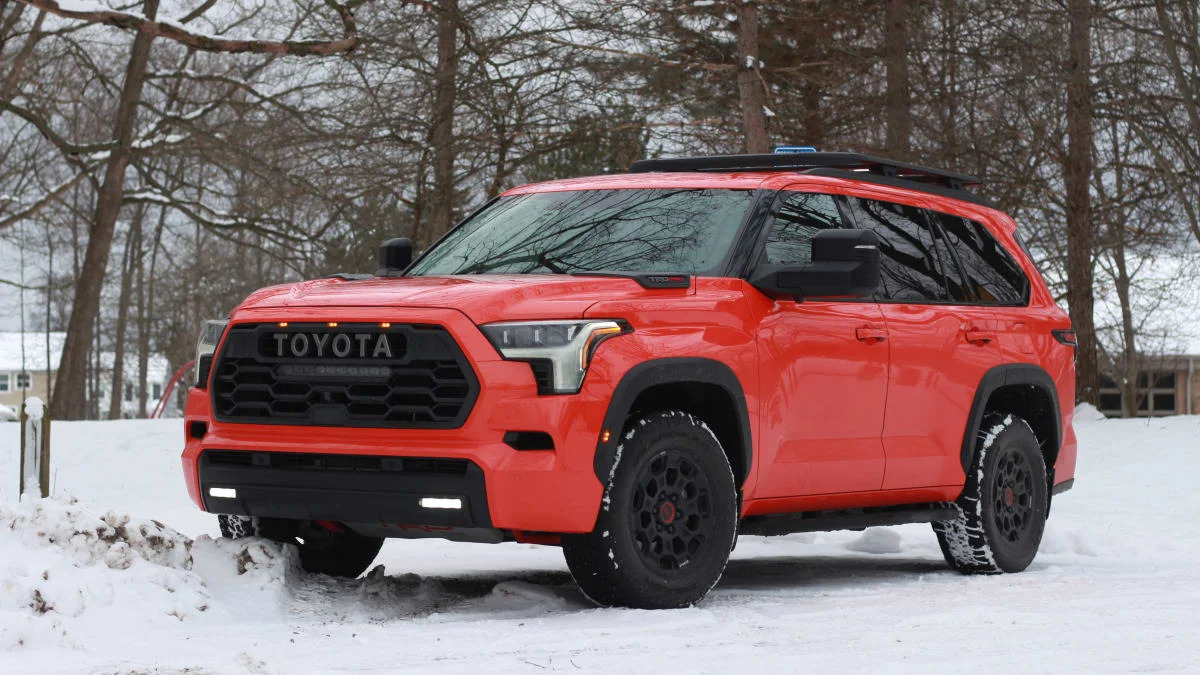
Toyota Sequoia Luggage Test
Take a deeper dive into why the Sequoia’s cargo area is so compromised and therefore uncompetitive.
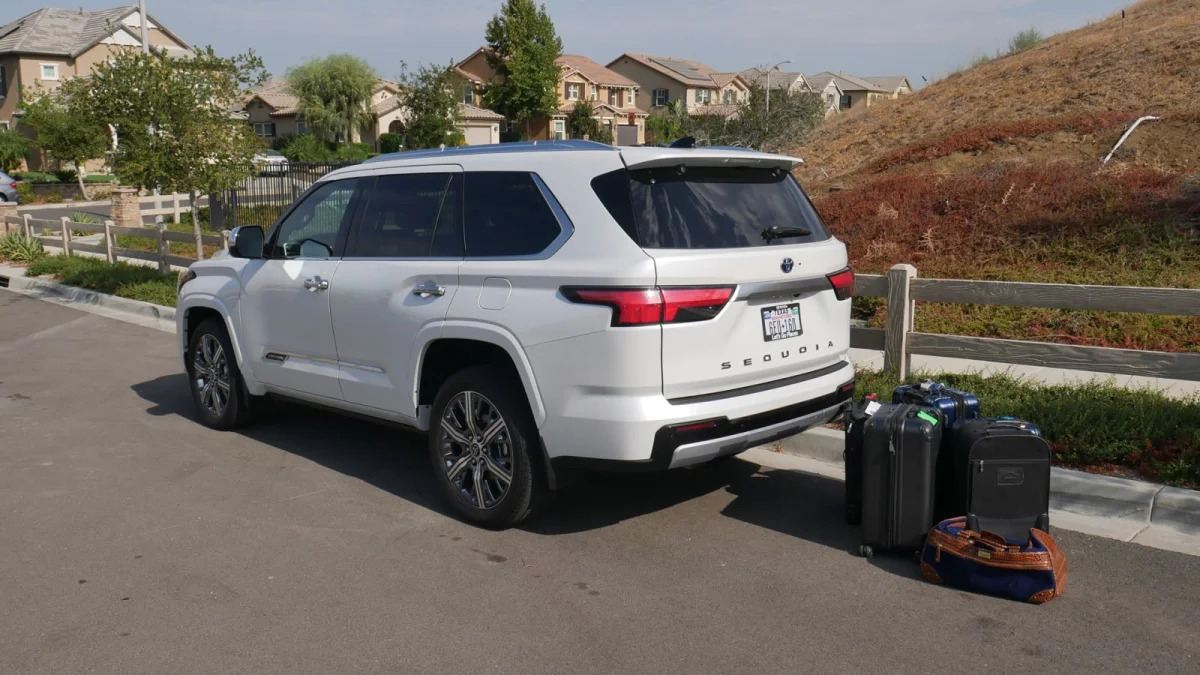
What is the 2024 Sequoia price, and where is it built?
Pricing for the 2024 Toyota Sequoia begins at $62,725, including the $1,850 destination charge, which is about $3,000 more than last year. Rear-wheel drive is standard on every Sequoia and four-wheel drive is a $3,000 option. At least that didn’t go up.
Unlike the rather sparsely equipped SR5 4Runner and Tacoma, the base Sequoia SR5 actually comes very well equipped with LED headlights and fog lights, a sunroof, three-zone climate control, heated front seats, a 60/40-split second row bench seat (captain’s chairs are the only choice on the Platinum, TRD Pro and Capstone), a leather-wrapped steering wheel, a panoramic parking camera, a 12.3-inch digital instrument panel, wireless Apple CarPlay and Android Auto, and an 8-inch touchscreen infotainment system. Every other trim gets a 14-inch system running basically the same interface.
The Limited is probably where most shoppers will start their Sequoia search given its added SofTex simulated leather upholstery, ventilated front seats, driver memory functions, a heated steering wheel and rear sunshades. There are then two levels of luxury trim level available: the Platinum or the even more luxurious Capstone, although we would strongly avoid the latter due to its 22-inch wheels and resulting horrible ride quality.
The TRD Pro is the rugged choice that adds an off-road suspension with Fox Internal Bypass coilovers and rear remote-reservoir shocks, a front stabilizer bar, all-terrain tires, improved clearances and unique design flourishes. The TRD Off-Road package is available on other trim levels and adds Bilstein shocks and springs for better off-road capability. The TRD Sport package goes in the opposite direction with a suspension tuned for better on-road handling.
SR5: $62,725
Limited: $69,125
Platinum: $75,315
TRD Pro: $80,560
Capstone: $77,865
The Sequoia is built in San Antonio, Texas.
What are the Sequoia safety ratings and driver assistance features?
Every 2024 Sequoia includes as standard forward collision warning with pedestrian detection, lane-keeping assist, blind-spot and rear cross-traffic warning, and adaptive cruise control with stop-and-go functionality and lane-centering steering assist. Also standard are front and rear parking sensors, and Safety Connect emergency communications services.
The 2024 Sequoia has not been crash tested by a third party.
